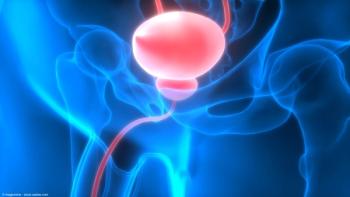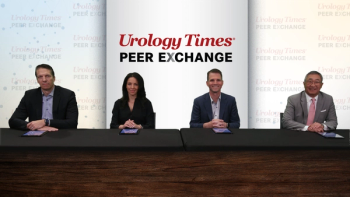
Schmidt notes that differences in response rates between disease subtypes largely reflect inherent tumor biology.

Schmidt notes that differences in response rates between disease subtypes largely reflect inherent tumor biology.

Safety outcomes were favorable: cystectomy-free survival was 94%, overall survival was 100%, and only 1 patient progressed to muscle-invasive disease.

Several experts share their thoughts on the impact of the gemcitabine intravesical system for BCG-unresponsive NMIBC.

Panelists discuss the critical unmet need for more personalized treatment in non–muscle-invasive bladder cancer (NMIBC), emphasizing the role of biomarkers, emerging modalities like radiation, and optimized therapy sequencing to improve outcomes, as current approaches still leave many patients at risk of relapse despite expanding therapeutic options.

Panelists discuss how the evolving treatment landscape for high-risk non–muscle-invasive bladder cancer (NMIBC) demands that urologists adapt to more complex delivery methods and integrate systemic therapies into care, emphasizing the need for patient education, new workflows, and multidisciplinary collaboration to ensure equitable access to emerging therapies across all practice settings.

Panelists discuss the growing emphasis on combination therapies for high-risk non–muscle-invasive bladder cancer (NMIBC), highlighting their potential to overcome BCG resistance through synergistic mechanisms, while emphasizing the need for biomarker-driven personalization, careful management of adverse effects, and more robust data to guide optimal sequencing and patient selection.

Panelists discuss the complexities of treatment selection and sequencing in non–muscle-invasive bladder cancer (NMIBC) amid pending trial data, emphasizing the potential of emerging chemotherapy backbones, biomarker-driven personalization, and patient-centered decision-making to balance efficacy, quality of life, and evolving bladder-preserving options.

Panelists discuss the evolving non–muscle-invasive bladder cancer (NMIBC) treatment landscape, emphasizing a shift away from BCG monotherapy for lower intermediate-risk patients toward combination and novel therapies for high-risk disease, while highlighting ongoing challenges related to toxicity, cost, BCG shortages, and the need for refined patient selection through biomarkers and precision medicine.

Panelists discuss novel intravesical drug delivery systems like TAR-200 and UGN-102 that enhance chemotherapy exposure and efficacy in non–muscle-invasive bladder cancer (NMIBC), while noting challenges in tolerability and administration, and highlighting their potential to improve patient outcomes and reduce invasive procedures.

Panelists discuss the expanding clinical development of cretostimogene across multiple NMIBC populations and treatment strategies, highlighting ongoing trials exploring its use as monotherapy and in combination with agents like gemcitabine or pembrolizumab, with the goal of optimizing efficacy, safety, and bladder preservation across diverse risk groups.

Panelists discuss the final BOND-3 trial results, highlighting intravesical cretostimogene’s strong efficacy, durable responses, and excellent safety profile in BCG-unresponsive carcinoma in situ (CIS), reinforcing its potential as a well-tolerated, bladder-preserving treatment option in a population with limited therapeutic choices.

Panelists discuss the promising results of the BOND-3 trial evaluating intravesical cretostimogene for BCG-unresponsive non–muscle-invasive bladder cancer (NMIBC), highlighting its high complete response rates, favorable safety profile, and potential to offer an effective, bladder-sparing alternative without the toxicity of systemic immunotherapy.

Panelists discuss emerging immunotherapy strategies for BCG-unresponsive non–muscle-invasive bladder cancer (NMIBC), particularly the combination of BCG with systemic checkpoint inhibitors, noting promising response rates but significant toxicity concerns that currently limit widespread adoption to select high-risk patients, pending further trial data and safety protocol development.

Panelists discuss current FDA-approved treatments for BCG-unresponsive carcinoma in situ, noting varying response rates among pembrolizumab, nadofaragene, and BCG combined with IL-15 superagonist, while highlighting promising investigational combination immunotherapies like oncolytic viruses and checkpoint inhibitors that may improve outcomes in this challenging patient population.

Panelists discuss emerging data comparing bladder-sparing therapies to radical cystectomy in BCG-unresponsive non–muscle-invasive bladder cancer (NMIBC), highlighting the nuanced trade-offs in oncologic outcomes and quality of life, and emphasizing the need for shared decision-making as prospective studies like CISTO refine patient selection for personalized treatment strategies.

Panelists discuss how recent advancements in NMIBC treatment, including the approval of nadofaragene firadenovec, pembrolizumab, and intravesical therapies like TAR-200, have reshaped care for BCG-unresponsive patients, with promising developments and ongoing trials at AUA 2025 paving the way for more personalized and effective treatment strategies in the future.

Panelists discuss how leveraging resources such as patient assistance programs, insurance navigators, clinical trial databases, advocacy groups, and oncology support services can help overcome access barriers, ensuring that NMIBC patients receive timely access to novel treatments like nadofaragene firadenovec and pembrolizumab.

Panelists discuss how overcoming challenges such as cost, insurance coverage, regulatory hurdles, patient selection, and the need for education is crucial for improving access to novel therapies like nadofaragene firadenovec and pembrolizumab, ultimately enhancing outcomes for NMIBC patients.

Panelists discuss how to approach treatment for a younger (49-year-old) male veteran with bladder cancer, focusing on the rising rates among veterans, challenges with recurrent disease despite BCG therapy, various second- and third-line treatment options, including gemcitabine-docetaxel combination therapy and the importance of thorough monitoring for disease progression.

Panelists discuss the expanding treatment options for BCG-unresponsive high-risk non–muscle-invasive bladder cancer, highlighting the benefits and limitations of FDA-approved therapies like pembrolizumab, nadofaragene, and nogapendekin, alongside off-label use of gemcitabine-docetaxel, as clinicians strive to balance efficacy, accessibility, and individualized care amid ongoing resource challenges.

Panelists discuss the evolving definition of BCG-unresponsive non–muscle-invasive bladder cancer (NMIBC), emphasizing its critical role in identifying patients who fail adequate BCG therapy, guiding next-line treatment decisions, and determining eligibility for clinical trials exploring novel therapeutic options.

Panelists discuss how recent trials, including KEYNOTE-057, QUILT-3.032, and CORE-001, highlight the promising efficacy, durability, and manageable safety profiles of novel treatments like pembrolizumab, nogapendekin alfa inbakicept, and nadofaragene firadenovec, while also exploring the potential of combination therapies and novel intravesical options like TAR-200 and UGN-102 for improving outcomes in non–muscle-invasive bladder cancer (NMIBC).

Panelists discuss how the ongoing ABLE-32 and ABLE-41 trials are exploring the efficacy and safety of nadofaragene firadenovec in different NMIBC patient populations, with ABLE-32 focusing on intermediate-risk patients and ABLE-41 examining real-world effectiveness and safety.

Panelists discuss how to manage the treatment of a 68-year-old woman with painless intermittent hematuria and positive cytology for high-grade urothelial cancer, addressing gender differences in diagnosis timing, the importance of repeat transurethral resection (TURBT) procedures, BCG therapy options, and considerations for radical cystectomy with pelvic organ preservation when BCG fails.

Panelists discuss how the ongoing BCG shortage has forced clinicians to adapt treatment strategies for non–muscle-invasive bladder cancer (NMIBC), balancing resource constraints with patient outcomes through dose adjustments, chemotherapy substitution, and earlier cystectomy, while emphasizing the importance of maintaining trial eligibility and adhering as closely as possible to evidence-based protocols.

Panelists discuss evolving strategies for managing non–muscle-invasive bladder cancer (NMIBC), highlighting how risk stratification, resource limitations, and emerging therapies like gemcitabine-docetaxel are shaping treatment decisions, while emphasizing the urgent need for predictive tools and biomarkers to guide personalized care.

Panelists discuss how real-world data from a recent Mayo Clinic study confirms the promising efficacy and favorable safety profile of nadofaragene firadenovec in BCG-unresponsive non–muscle-invasive bladder cancer (NMIBC), highlighting high cystectomy-free and overall survival rates, with longer follow-up needed to assess response durability.

Panelists discuss how nogapendekin alfa, an intravesical immunotherapy that stimulates a localized immune response, combined with BCG therapy, provides a novel dual approach for treating BCG-unresponsive non–muscle-invasive bladder cancer (NMIBC), targeting both local and systemic immune responses.

Panelists discuss how they approach a typical bladder cancer case of a 79-year-old man with hematuria, including initial diagnostic procedures, the importance of proper tumor measurement during resection, BCG therapy protocols, and management options for BCG-unresponsive disease with a focus on nadofaragene firadenovec (Adstiladrin).

Panelists discuss how pembrolizumab, a PD-1 inhibitor, offers a systemic immunotherapy option for high-risk, BCG-unresponsive non–muscle-invasive bladder cancer (NMIBC) by enhancing the immune system’s ability to target cancer cells, with intravenous administration and careful monitoring for immune-related adverse effects.

Published: November 11th 2025 | Updated: